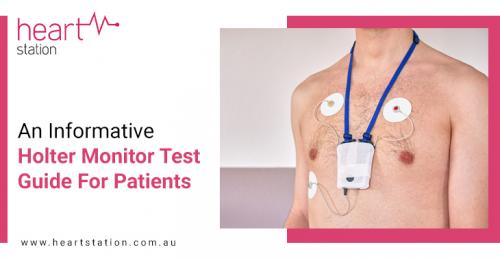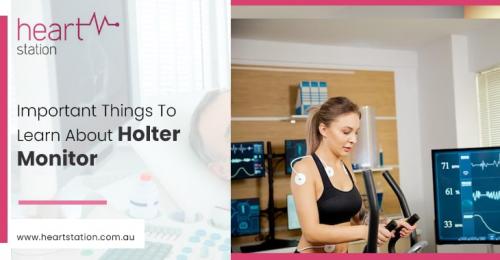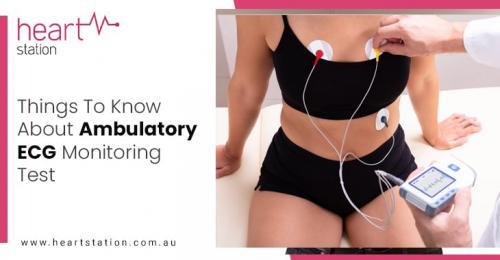An Informative Holter Monitor Test Guide For Patients

This comprehensive guide provides patients valuable insights into the Holter Monitor Test, an essential tool for heart health monitoring. Learn about its purpose, procedure, preparation, and significance.
An Informative Holter Monitor Test Guide for Patients Medical technology advancements have revolutionised how healthcare professionals diagnose and monitor various conditions. One such innovation is the Holter Monitor Test, a crucial tool in cardiology. This guide aims to shed light on the Holter monitor test, offering patients a comprehensive understanding of its purpose, procedure, preparation, and significance in maintaining heart health.
1. Understanding the Holter Monitor Test
2. The Purpose of the Holter Monitor Test
3. The Holter Monitor Test Procedure
4. Preparation for the Holter Monitor Test
5. Relaxing Before a Holter Monitor Test
6. The Significance of the Holter Monitor Test
Understanding the Holter
Monitor Test:
The Holter monitor test, named after its inventor Dr Norman Holter, is a non-invasive procedure that tracks and records the heart's electrical activity over an extended period, typically 24 to 48 hours. This monitoring is accomplished by using a compact device worn by the patient, continuously recording the heart's rhythms and fluctuations. The primary objective of the Holter monitor test is to identify irregular heart rhythms, known as arrhythmias, that might not be captured in a short-duration electrocardiogram (ECG) test.
The Purpose of the Holter
Monitor Test:
The human heart is a complex organ that exhibits various electrical patterns. Detecting irregular heart rhythms is crucial as they often go unnoticed, leading to serious complications, including strokes and heart attacks. The Holter monitor test plays a vital role in diagnosing arrhythmias, enabling healthcare providers to analyse a larger data set and gain insights into the heart's behaviour during the patient's daily activities, including sleep.
The Holter Monitor Test
Procedure:
The procedure for the Holter monitor test is relatively straightforward and painless. During the appointment, a healthcare professional will attach electrodes to specific locations on the patient's chest. These electrodes are connected to the Holter monitor device, a small recorder worn using a belt or a shoulder strap. Once the device is attached, patients are instructed to go about their daily routine while the monitor records their heart's electrical activity.
Throughout the monitoring period, patients are encouraged to keep a diary, noting any symptoms or activities that may coincide with changes in their heart rhythm. This information provides valuable context for healthcare providers when analysing the recorded data.
Preparation for the Holter
Monitor Test:
Preparing for the Holter monitor test is simple but essential to ensure accurate results. Patients should follow these guidelines:
Clean Skin: Ensure that the skin on your chest is clean and free from any lotions, oils, or creams that might interfere with the electrode connections.
Loose Clothing: Wear loose-fitting clothing to facilitate easy attachment of the electrodes and the Holter monitor device.
Diary: Begin keeping a diary of your activities, including meals, exercises, and any symptoms you experience.
Normal Routine: During the monitoring period, maintain your normal routine to represent your heart's activity accurately.
Avoid Moisture: Keep the Holter monitor device dry, as moisture can damage the equipment.
Follow Instructions: Listen to the instructions of the healthcare professional, especially regarding the proper placement of the electrodes and the use of the monitor.
Relaxing Before a Holter
Monitor Test:
Facing a medical procedure, even a non-invasive one like a Holter monitor test can cause anxiety and stress. Taking steps to relax before the test can make the experience more comfortable.
Deep Breathing: Engage in deep breathing exercises. Inhale slowly through your nose, hold for a few seconds and exhale through your mouth. This technique calms your nervous system and lowers anxiety.
Visualisation: Close your eyes and imagine a serene place – a beach, a forest, or a meadow. Visualising yourself in a calming environment can help reduce stress.
Listening to Music: Bring your favourite calming music along. Listening to soothing tunes can distract your mind and create a relaxing atmosphere.
Positive Affirmations: Remind yourself that the test is routine and you are in capable hands. Repeating positive affirmations can ease worries.
Mindfulness: Practice mindfulness by focusing on your breath or the present moment. Mindful thinking can help prevent your mind from wandering to stressful thoughts.
Talk to the Technician: If you have questions or concerns, discuss them with the technician. Clearing doubts can alleviate worries.
The Significance of the
Holter Monitor Test:
The Holter Monitor Test offers several advantages over traditional ECG tests, primarily due to its extended monitoring period. The data recorded by the device provides a comprehensive overview of the heart's behaviour during various activities, including sleep and exercise. This in-depth information enables healthcare providers to:
Detect Hidden Arrhythmias: Some arrhythmias only occur sporadically, making them challenging to diagnose during a short ECG. The Holter monitor test's prolonged monitoring captures these irregularities, aiding accurate diagnosis.
Evaluate Treatment Efficacy: The Holter monitor test helps assess the effectiveness of prescribed medications or interventions for patients already diagnosed with arrhythmias.
Customise Treatment Plans: Accurate data from the Holter monitor test allows healthcare providers to tailor treatment plans based on the patient's unique heart activity patterns.
Monitor Progress: The test is often repeated at intervals to monitor changes in heart activity and adjust treatment plans accordingly.
Conclusion
The Holter Monitor Test is a remarkable diagnostic tool that empowers healthcare professionals to gain comprehensive insights into a patient's heart health. This test plays a crucial role in early diagnosis, effective treatment, and improved management of heart-related conditions by accurately detecting irregular heart rhythms and providing an extended monitoring period. As patients, understanding the purpose, procedure, preparation, and significance of the Holter monitor test can help us actively participate in our healthcare journey and take proactive steps toward maintaining a healthy heart.
Author’s Bio
The author of this article is an expert in researching several diagnostic techniques. He has a special interest in tests that can help diagnose cardiac problems.


Comments